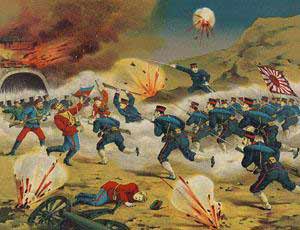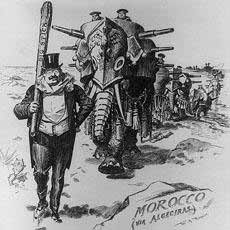|
 President Theodore Roosevelt stands by a globe in this 1905 photograph |
Theodore Roosevelt was president of the United States during the early years of the 20th century. He was a forceful leader. His national policies led to social reforms and federal protection of nature.
His foreign policy led to greater American involvement in world events.
This week in our series, Kay Gallant and Harry Monroe continue the story of the presidency of Theodore Roosevelt.
KAY GALLANT: In 1903, Panama declared its independence from Colombia. Fifteen days later, Panama and the United States signed a treaty. The treaty gave the United States the right to build a canal across Panama.
To protect the canal, President Roosevelt declared greater responsibility for a wide area around the canal. The greatest responsibility was financial. Roosevelt said the United States would guarantee repayment of loans made to Latin American countries.
He did this to prevent European countries from using the issue of non-payment as an excuse to seize new territory in the Western Hemisphere.
HARRY MONROE: Some Latin American nations were in serious economic trouble. Venezuela was one.
|
 A Japanese painting from 1904 showing the Battle of the Yalu River between the forces of Japan and Russia |
Their ships began blocking Venezuela's ports. When they began shelling coastal areas, President Roosevelt intervened. He urged them to let the international court of arbitration at The Hague settle the dispute.
They agreed. And the blockade of Venezuela ended.
KAY GALLANT: Less than two years later, a similar financial problem arose in the Dominican Republic. Revolutions and dictatorships there prevented re-payment of foreign loans.
The United States offered a solution. It would take over collection of import taxes at ports in the Dominican Republic. Forty-five percent of the money would be paid to the Dominican government. The other 55 percent would be used to repay loans. The Dominican Republic agreed. The plan succeeded.
Some countries in Latin America and the Caribbean questioned the right of the United States to act as policeman for the Western Hemisphere. But none openly opposed President Roosevelt's policy.
|
 President Roosevelt with representatives of the Russian Czar and the Japanese Emperor |
Republican Party leaders, however, were not so sure. Roosevelt had made businessmen angry, because of his attempts to control big companies. But he made voters happy, because of his fight for social reforms.
Roosevelt's only serious competitor for the nomination was a long-time senator and presidential adviser. But the man died before the nominating convention. So, Roosevelt won the nomination easily.
KAY GALLANT: The Democratic Party, in the past two elections, had nominated a progressive, Congressman William Jennings Bryan, as its candidate. This time, the Democrats chose a more conservative candidate. He was a New York judge, Alton Parker.
Judge Parker had no chance to win the election. Theodore Roosevelt was the best-known man in America. He won easily.
On inauguration day, Roosevelt made a short speech. He said America's capitalist economic system had done much good for the country. But it also had created a crisis in social relations. And the crisis had to be solved. "If we fail," Roosevelt said, "the cause of self-government throughout the world will suffer greatly."
HARRY MONROE: During his new term in office, President Roosevelt was able to get Congress to approve two major new laws. One was the Hepburn Act. This law gave the Interstate Commerce Commission power to limit how much railroads could charge for transporting goods. The purpose was to keep the cost of railroad transportation reasonable.
The other new law was the Pure Food and Drug Act. This law declared it illegal to make or sell foods and medicines containing harmful chemicals. The purpose was to protect the health of all Americans.
KAY GALLANT: President Roosevelt's most important foreign policy success came as a result of a war between Russia and Japan.
At that time, Russia occupied Manchuria in northern China. Japan occupied Korea. Japan wanted control of Manchuria. It needed that area's coal and iron ore. Japan also wanted to end any Russian threat to Korea. So, it decided to fight.
Japan's navy easily defeated all the Russian fleets sent to the Pacific. But the two sides continued to fight on land. When both began to run out of money, they accepted President Roosevelt's offer to make peace.
HARRY MONROE: Roosevelt invited Japanese and Russian diplomats to meet with him in Portsmouth, New Hampshire. He told them his greatest hope and prayer was for them to find a just and lasting peace quickly. A quick settlement, however, was not easy.
Japan demanded 600 million dollars for war damages. It also wanted Sakhalin Island. Russia rejected both demands. It had agreed to give up southern Manchuria. Russia would give up nothing else.
Negotiations lasted many days. President Roosevelt became more and more angry when neither side would compromise. But he remained calm and kept the talks going.
Later, he said: "What I really wanted to do was give an angry shout, jump up, and knock their heads together."
KAY GALLANT: Finally, Roosevelt made a secret appeal to the Emperor of Japan. He asked the Emperor to drop demands for money and for Sakhalin Island. He warned that Russia was ready to fight again if the peace talks failed.
The Emperor agreed to drop the demand for money. But, he still demanded half of Sakhalin Island. Russia agreed to this compromise. The two sides signed a peace treaty.
HARRY MONROE: Theodore Roosevelt received the Nobel Peace Prize for negotiating an end to the Russian-Japanese war. However, his efforts were denounced in Japan. Roosevelt was held responsible for the loss of war damage payments. It was money Japan needed badly.
Anti-American riots broke out in some parts of the country. At the same time, tense relations developed between American citizens and Japanese immigrants in California.
Poor Japanese immigrants were willing to work for low pay. As a result, Americans lost jobs. They protested. Then school officials in San Francisco barred Japanese children from attending school with white children.
President Roosevelt opposed the decision. He asked the officials to lift the ban. In exchange, he agreed to ask Japan to stop its poor farmers and laborers from going to live in America.
Japan said it would. The understanding became known as the Gentleman's Agreement.
KAY GALLANT: Roosevelt worked hard to improve America's relations with Japan. Yet he made clear that the United States would defend its interests in Asia and the Pacific.
As a warning, he sent a naval force on a voyage around the world. The force included 16 battleships and 12,000 men. It was called the Great White Fleet.
The voyage lasted 14 months. The fleet sailed down the Atlantic coast of South America. It went around the bottom of South America into the Pacific Ocean, then on to Hawaii, Australia, and Japan.
Surprisingly, it received its warmest welcome in Japan.
An American reporter said: "The fleet made a deep and far-reaching impression. It caused the Japanese to understand the great power of the United States, as nothing else could possibly have done."
|
 A cartoon from Harper's Magazine shows President Roosevelt carrying his "big stick" while trying to end a dispute of European powers over Morocco |
HARRY MONROE: Theodore Roosevelt greatly enjoyed playing the part of peace-maker. After successfully ending the war between Russia and Japan, he was asked to settle another international dispute. At issue was control over Morocco.
That will be our story next week.
(MUSIC)
BOB DOUGHTY: Our program was written by Frank Beardsley. The narrators were Kay Gallant and Harry Monroe. You can find our series online with transcripts, MP3s, podcasts and images at voaspecialenglish.com. You can also follow us on Facebook and Twitter at VOA Learning English.
Join us again next week for THE MAKING OF A NATION -- an American history series in VOA Special English.
Manchuria: 滿洲(我國東北的舊稱)
Sakhalin Island: 庫頁島(薩哈林島)
American history: Panama breaks with Colombia, clearing way for the Panama Canal
American History: Teddy Roosevelt wrestles powerful business interests
American history: Teddy Roosevelt leads nation after killing of McKinley
American history: occupation of Philippines makes US a major power in the far East
American history: treaty brings quick end to Spanish-American war
American history: a dispute over Cuba leads to the Spanish-American war
American history: US influence begins to extend far beyond its shores
(來源:VOA 編輯:陳丹妮)
